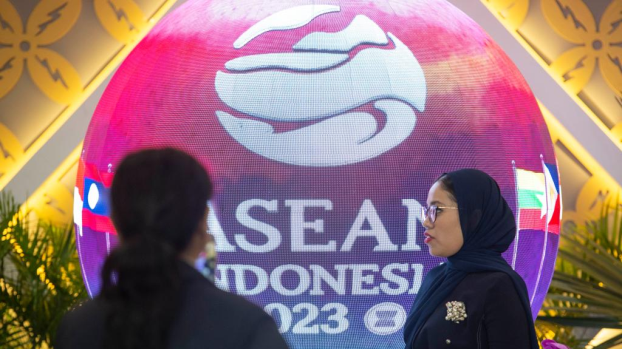
People walk past a spherical display showing the logo of the 43rd ASEAN Summit at Jakarta Convention Center in Jakarta, Indonesia, September 4, 2023. [Photo/Xinhua]
By Bobby M. Tuazon
The 43rd Association of Southeast Asian Nations (ASEAN) Summit and related summits kicked off on September 5 in Indonesia, with a focus on establishing the region as an epicenter of economic growth.
It's noted that the U.S., Indonesia, and five other nations conducted on August 31, just several days before the ASEAN summit, training exercises on Java with ASEAN members the Philippines, Brunei, and Malaysia as observers. Besides, U.S. President Joe Biden will not attend the summit and will be represented by his Vice President Kamala Harris, sending signals that ASEAN and Indonesia are at the moment not a priority of the U.S.
How these dimensions will impact the ASEAN summit is yet to be seen. For one, China and Indonesia maintain a comprehensive and strategic partnership. Similarly, strong trade relations define the Philippines' ties with China but the former state's defense relationship with the U.S. is unsettling to Beijing.
27-year China-ASEAN relationship has been marked by friendship and solidarity. After becoming a full dialogue partner in 1996, China became ASEAN's largest trading partner beginning from 2009. Since then, China has adopted a policy of good neighborliness and non-interference toward ASEAN. During the 1997 Asian financial crisis, China not only did not devalue its currency yuan but also provided financial support to crisis-ridden countries like Thailand and Indonesia. In 2003, China acceded to the Treaty of Amity and Cooperation (TAC) in Southeast Asia, leading the way among all of ASEAN's dialogue partners and upgrading the relationship to a "strategic partnership for peace and prosperity." Ten years later, ASEAN countries responded positively to Chinese President Xi Jinping's call in Jakarta on a joint Belt and Road Initiative (BRI) program. Under the BRI framework, Chinese foreign direct investment and construction projects in ASEAN have increased by 85 percent and 33 percent, respectively. Significantly, in 2020 ASEAN overtook the U.S. to become China's largest trading partner. With the RCEP taking effect in January 2022, ASEAN-China bilateral trade jumped from $641.5 billion in 2019 to $975.3 billion.
To fully comprehend China's role in the ASEAN summit, global stability, and increased economic cooperation undergird the external key to China's 2020 target of substantially addressing its social problems – which it achieved by eradicating absolute poverty that year - and 2035 goal of a "mid-level developed country." China is now prioritizing trade and economic cooperation in Asia, particularly Southeast Asia where it is pushing a "win-win" economic partnership by building or expanding special economic zones, trade complexes, industrial and IT (Information technology) parks, as well as ports, expressways, and railways.
Conversely, the U.S. through Biden's absence in the summit indicated that ASEAN and Indonesia are not U.S.'s priorities. Washington downplays ASEAN's ability to address regional dynamics and is unable to settle disputes over waters. The interventionist approach of the U.S. is anathema to the ASEAN way of resolving issues by consensus-building and peaceful negotiations. America's approach does not appeal to ASEAN except possibly in the case of a founding member – the Philippines – whose strong security alliance with the U.S. is in contradiction with the regional group's neutrality.
Today, the "Indo-Pacific strategy" of the U.S. continues to challenge the ASEAN's cooperation. In the "Indo-Pacific Strategic Framework," the U.S. aims to deepen its security relationship with Malaysia, Indonesia, Vietnam and Singapore. The Biden administration has upgraded the "Quadrilateral Security Dialogue" (the United States, Japan, Australia, and India) and established in 2021 the Australia-UK-U.S. Trilateral Security Partnership Agreement (AUKUS), aiming to further strengthen military deterrence and strategic containment of China.
While U.S. actions are fomenting tensions in the region, ASEAN member countries are most responsive to the completion of the proposed Code of Conduct (CoC) – a virtual non-aggression pact aimed at preventing the territorial spats in the South China Sea from turning into an armed conflict. On July 13, China and the ASEAN agreed to conclude the CoC within three years or by 2026. The guidelines would include whether the code should be legally enforceable and its geographical scope. China had earlier proposed that the code restrict the presence and activities of foreign forces in the disputed waters. It was opposed by U.S. officials swearing that Washington serves a crucial role as a counterweight to Beijing.
Despite ups and downs as well as policy differences, ASEAN remains intact after 56 years. It has succeeded in safeguarding its centrality to managing disputes and potential conflicts between major powers with China on one hand and the U.S. and its allies on the other. Regional peace has been preserved between ASEAN and China especially because it is sustained by strong economic and development partnerships.
"Don't make our ship, ASEAN, become an arena of rivalry that causes damages to each other. Make our ship the foundation to build cooperation and create prosperity, stability, and peace, not only for the region but also for the world," Indonesian President Joko Widodo addressed the opening ceremony of the ASEAN summit.
A strong ASEAN is a solid step toward building a multipolar world comprising the majority of states in the global community and hastening the decline of the U.S.-led Western hegemony that has ruled the world for centuries. ASEAN joins the BRICS+6, Shanghai Cooperation Organization (SCO), Forum on China-Africa Cooperation, and the BRI's about 150 countries in forging a new world of peace and development.
Bobby M. Tuazon, a special commentator on current affairs for CGTN, is the Policy Studies Director at the Philippine think tank Center for People Empowerment in Governance. He teaches international politics at the University of the Philippines.

 中文
中文



